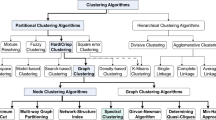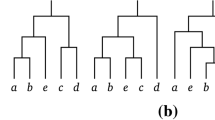Abstract
Cartesian product (CP) files have been shown to be very effective for partial match retrieval. Further the Disk Modulo (DM) allocation method has been shown to be a simple and effective method for allocating CP files onto multiple independently accessible disks to further facilitate partial match retrieval. In this paper, a useful criterion for the DM method to be the best allocation method for a given CP file is presented. The presented criterion is much more general than that suggested previously which makes the DM allocation method much more applicable for real applications.
Similar content being viewed by others
References
Aho, A. V. and Ullman, J. D.,Optimal partial-match retrieval when fields are independently specified, ACM Trans. on Database Systems, Vol. 4, No. 2, (1979) pp. 168–179.
Chan, M. Y.,Multidisk file design: An analysis of folding buckets to disks, BIT, Vol. 24, (1984) pp. 262–268.
Chan, M. Y.,A note on redundant disk modulo allocation, IPL, Vol. 20, (1985) pp. 121–123.
Chang, C. C.,Application of principal component analysis to multi-disk concurrent accessing, BIT, Vol. 28, (1988) pp. 205–214.
Chang, C. C. and Chen, C. Y.,Performance analysis of the generalized disk modulo allocation method for multiple key hashing files on multi-disk systems, Computer Journal, Vol. 30, No. 6, (1987) pp. 535–540.
Chang, C. C. and Chen, C. Y.,Performance of two-disk partition data allocations, BIT, Vol. 27, (1987) pp. 306–314.
Chang, C. C. and Chen, C. Y.,Some properties of Cartesian product files for disk modulo allocation method in a two-disk system, Information Science and Engineering, Vol. 3, No. 2, (1987) pp. 151–176.
Chang, C. C. and Chen, C. Y.,Gray code as a de-clustering scheme for concurrent disk retrieval, Information Science and Engineering, Vol. 13, No. 2, (1987) pp. 177–188.
Chang, C. C. and Chen, C. Y.,Symbolic Gray code as a data allocation scheme for two-disk systems, to appear in Computer Journal (1988).
Chang, C. C. and Chen, C. Y.,A recursive performance formula of disk modulo allocation method for binary Cartesian product files, Computer Journal, Vol. 31, No. 6, (1988) pp. 565–566.
Chang, C. C. and Chen, C. Y.,A note on allocating k-ary multiple key hashing files among multiple disks, to appear in Information Science.
Chang, C. C., Du, M. W. and Lee, R. C. T.,Performance analysis of Cartesian product files and random files, IEEE Trans. on Software Engineering, Vol. SE-10, No. 1, (1984) pp. 88–99.
Chang, C. C., Lee, R. C. T. and Du, H. C.,Some properties of Cartesian product files, Proceedings of ACM-SIGMOD 1980 Conference, pp. 157–168.
Chang, C. C., Lee, R. C. T. and Du, M. W.,Symbolic Gray code as a perfect multi-attribute hashing scheme for partial match queries, IEEE Trans. on Software Engineering, Vol. SE-8, No. 3, (1982) pp. 235–249.
Chang, C. C. and Shieh, J. C.,On the complexity of file allocation problem, Proceedings of the International Conference on Foundations of Data Organization, Kyoto, Japan, May 1985, pp. 113–115.
Du, H. C.,Disk allocation method for binary Cartesian product files, BIT, Vol. 26, (1986) pp. 138–147.
Du, H. C. and Sobolewski, J. S.,Disk allocation for Cartesian product files on multiple disk systems, ACM Trans. on Database Systems, Vol. 7, (1982) pp. 82–101.
Lee, R. C. T. and Tseng, S. H.,Multi-key sorting, Policy Analysis and Information Systems, Vol. 3, No. 2, (1979) pp. 1–20.
Lin, W. C., Lee, R. C. T. and Du, H. C.,Common properties of some multi-attribute file systems, IEEE Trans. on Software Engineering, Vol. SE-5, No. 2, (1979) pp. 160–174.
Liou, J. H. and Yao, S. B.,Multi-dimensional clustering for data base organizations, Information Systems, Vol. 2, (1977) pp. 187–198.
Rivest, R. L.,Partial-match retrieval algorithms, SIAM Journal of Computing, Vol. 14, No. 1, (1976) pp. 19–50.
Rothnie, J. B. and Lozano, T.,Attribute based file organization in paged memory environment, Commun. Assoc. for Computing Machinery, Vol. 17, No. 2, (1974) pp. 63–69.
Sung, Y. Y.,Performance analysis of disk modulo allocation method for Cartesian product files, IEEE Trans. on Software Engineering, Vol. SE-13, No. 9, (1987) pp. 1018–1026.
Tang, C. Y., Buehrer, D. J. and Lee, R. C. T.,On the complexity of some multi-attribute file design problems, Information Systems, Vol. 10, No. 1, (1985) pp. 21–25.
Author information
Authors and Affiliations
Rights and permissions
About this article
Cite this article
Chen, C.Y., Lin, H.F. Optimality criteria of the disk modulo allocation method for Cartesian product files. BIT 31, 566–575 (1991). https://doi.org/10.1007/BF01933172
Received:
Issue Date:
DOI: https://doi.org/10.1007/BF01933172




